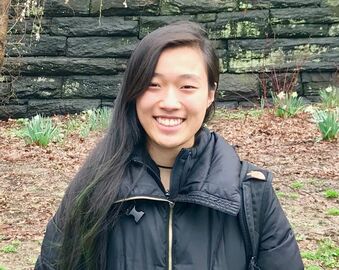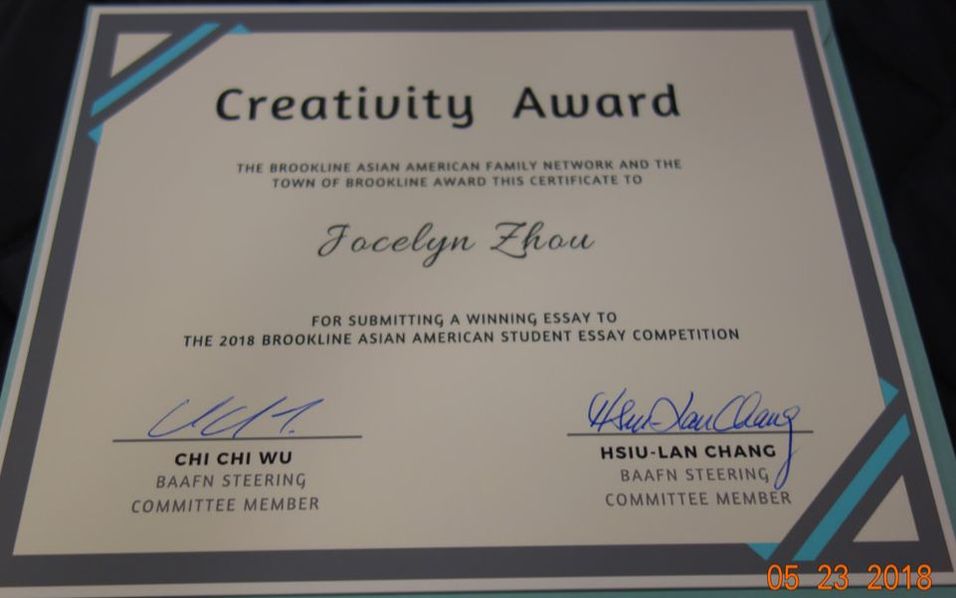2018 BAAFN Creativity Award
吃苦
by Jocelyn Zhou
by Jocelyn Zhou
At six months old, just barely understanding the concept of diapers, I was carried to China like a precious sack of potatoes that cried at inconvenient times. My grandmother rocked me back and forth, cooing Shanxi dialect into my ears until the pilot chased down the sun and landed in the next day. My early years seem stitched together from such moments, moments filled with the hurry of airports, the care of various different relatives, and the sound of unfamiliar languages, for it is only natural for a child of divorced and somewhat nomadic parents to be constantly traveling.
After the school year whirled by, I would spend my summer shuttling between my dad in Hangzhou and my grandparents in Shanxi. When I went from American seedless watermelon to fresh lychee fruit in less than 24 hours, I greeted my family with sticky hands and sweet smiles. When I returned to my mother at the end of August with dirty socks and my loot of new clothes from doting relatives, we were often in a new apartment, in a new town, in a new school.
Even from the very beginning, I was always “in between.” In between parents, in between continents, in between cultures. What does “home” and “identity” mean to someone who doesn’t have somewhere to come from, to someone who doesn’t have somewhere to return to?
Here, in the United States, I’m American, but I’m not American. In China, I have Chinese heritage, but I’m not Chinese. People label me “Chinese American,” but that only means that neither country claim full responsibility.
But other people can’t tell me who I am. So, what does being “Chinese American” mean to me?
For a long time, I didn’t know the answer. I stopped asking the question. However, Brookline High School has a way of making you ask hard questions and pushing you to discover the answers. Our annual assembly Courageous Conversations caused my question to resurface, and hearing other Asian Americans talk about their struggles with identity forced me face my own uncertainties.
With my mind reopened, I went on a community service and cultural exchange project to Shanxi with my Sunday Chinese school last April break. There, we met a student named Gongjie, a boy my age. He lived in a rundown one room shack with his family, and his parents collected and sold trash as a living. At one point, Gongjie stopped eating dinner in order to save money for his parents and food for his younger brother. But he kept persevering; he “吃苦” (“eat bitterness”). His poverty didn’t steal his hope for the future or his belief that the world was a wonderful place. He kept studying and earned the top rank in his class.
Meeting Gongjie changed me. I was so proud that I came from a nation of people so dedicated to life, to learning, and so resilient in their pursuit of their dreams despite their deprivation. I was in awe of my parents and their Chinese spirit. I was in awe of how they escaped their cycle of poverty and thankful for the opportunities I had in America and the freedom to more choices because I was not limited by my circumstances. For the first time, I felt close to finding myself. But I realized something--the distance between who I was and who I wanted to be was much greater than what I was comfortable with.
Yet, I had a place to start. I wanted to strive for my dreams like my parents and Gongjie did. I wanted to take that Chinese work ethic and make something of myself with all the possibilities I’m blessed with here in Brookline.
To me, being “Chinese American” is the embodiment of where the “American Dream” and the “Immigrant Narrative” intersect. Everything I come from--my two worlds and their two cultures--is founded on the belief that hard work will always lead to accomplishments and that value is at the core of who I am. Yes, the US and China are still tremendously different in obvious and nuanced ways, and those difference affect the choices I make and how I perceive the world, but they affect me in a good way, for those differences make me a more balanced, appreciative, and empathetic person.
Because of my Chinese American identity, no matter the hardships I may face in life, I’m not giving up. I will continue to work towards my “American Dream” and 吃苦 to get there.
At six months old, just barely understanding the concept of diapers, I was carried to China like a precious sack of potatoes that cried at inconvenient times. My grandmother rocked me back and forth, cooing Shanxi dialect into my ears until the pilot chased down the sun and landed in the next day. My early years seem stitched together from such moments, moments filled with the hurry of airports, the care of various different relatives, and the sound of unfamiliar languages, for it is only natural for a child of divorced and somewhat nomadic parents to be constantly traveling.
After the school year whirled by, I would spend my summer shuttling between my dad in Hangzhou and my grandparents in Shanxi. When I went from American seedless watermelon to fresh lychee fruit in less than 24 hours, I greeted my family with sticky hands and sweet smiles. When I returned to my mother at the end of August with dirty socks and my loot of new clothes from doting relatives, we were often in a new apartment, in a new town, in a new school.
Even from the very beginning, I was always “in between.” In between parents, in between continents, in between cultures. What does “home” and “identity” mean to someone who doesn’t have somewhere to come from, to someone who doesn’t have somewhere to return to?
Here, in the United States, I’m American, but I’m not American. In China, I have Chinese heritage, but I’m not Chinese. People label me “Chinese American,” but that only means that neither country claim full responsibility.
But other people can’t tell me who I am. So, what does being “Chinese American” mean to me?
For a long time, I didn’t know the answer. I stopped asking the question. However, Brookline High School has a way of making you ask hard questions and pushing you to discover the answers. Our annual assembly Courageous Conversations caused my question to resurface, and hearing other Asian Americans talk about their struggles with identity forced me face my own uncertainties.
With my mind reopened, I went on a community service and cultural exchange project to Shanxi with my Sunday Chinese school last April break. There, we met a student named Gongjie, a boy my age. He lived in a rundown one room shack with his family, and his parents collected and sold trash as a living. At one point, Gongjie stopped eating dinner in order to save money for his parents and food for his younger brother. But he kept persevering; he “吃苦” (“eat bitterness”). His poverty didn’t steal his hope for the future or his belief that the world was a wonderful place. He kept studying and earned the top rank in his class.
Meeting Gongjie changed me. I was so proud that I came from a nation of people so dedicated to life, to learning, and so resilient in their pursuit of their dreams despite their deprivation. I was in awe of my parents and their Chinese spirit. I was in awe of how they escaped their cycle of poverty and thankful for the opportunities I had in America and the freedom to more choices because I was not limited by my circumstances. For the first time, I felt close to finding myself. But I realized something--the distance between who I was and who I wanted to be was much greater than what I was comfortable with.
Yet, I had a place to start. I wanted to strive for my dreams like my parents and Gongjie did. I wanted to take that Chinese work ethic and make something of myself with all the possibilities I’m blessed with here in Brookline.
To me, being “Chinese American” is the embodiment of where the “American Dream” and the “Immigrant Narrative” intersect. Everything I come from--my two worlds and their two cultures--is founded on the belief that hard work will always lead to accomplishments and that value is at the core of who I am. Yes, the US and China are still tremendously different in obvious and nuanced ways, and those difference affect the choices I make and how I perceive the world, but they affect me in a good way, for those differences make me a more balanced, appreciative, and empathetic person.
Because of my Chinese American identity, no matter the hardships I may face in life, I’m not giving up. I will continue to work towards my “American Dream” and 吃苦 to get there.



